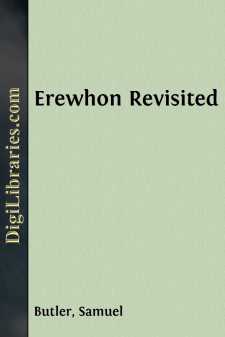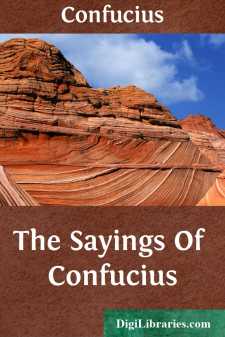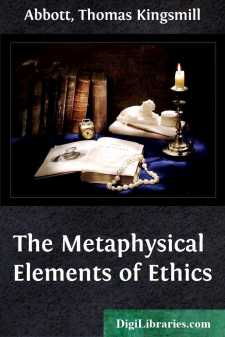Philosophy
- Aesthetics 11
- Eastern 1
- Ethics & Moral Philosophy 2
- General
- Hindu 2
- History & Surveys 3
- Logic 1
- Metaphysics 3
- Political 1
- Religious 7
- Social 3
- Taoist 1
General Books
Sort by:
by:
Samuel Butler
CHAPTER I: UPS AND DOWNS OF FORTUNE—MY FATHER STARTS FOR EREWHON Before telling the story of my father’s second visit to the remarkable country which he discovered now some thirty years since, I should perhaps say a few words about his career between the publication of his book in 1872, and his death in the early summer of 1891. I shall thus touch briefly on the causes that occasioned his failure...
more...
The reason passes, like the heart, through certain epochs and transitions, but its development is not so often portrayed. Men seem to have been satisfied with unfolding the passions in their extremes, their aberration, and their results, without considering how closely they are bound up with the intellectual constitution of the individual. Degeneracy in morals roots in a one-sided and wavering...
more...
by:
Epictetus
I Are these the only works of Providence within us? What words suffice to praise or set them forth? Had we but understanding, should we ever cease hymning and blessing the Divine Power, both openly and in secret, and telling of His gracious gifts? Whether digging or ploughing or eating, should we not sing the hymn to God:— Great is God, for that He hath given us such instruments to till the ground...
more...
by:
Confucius
INTRODUCTION Confucius was born in the year 550 b.c., in the land of Lu, in a small village, situated in the western part of the modern province of Shantung. His name was K'ung Ch'iu, and his style (corresponding to our Christian name) was Chung-ni. His countrymen speak of him as K'ung Fu-tzu, the Master, or philosopher K'ung. This expression was altered into Confucius by the Jesuit...
more...
PREFACE. This work is called the Critique of Practical Reason, not of the pure practical reason, although its parallelism with the speculative critique would seem to require the latter term. The reason of this appears sufficiently from the treatise itself. Its business is to show that there is pure practical reason, and for this purpose it criticizes the entire practical faculty of reason. If it...
more...
by:
George Santayana
I A good portrait of Locke would require an elaborate background. His is not a figure to stand statuesquely in a void: the pose might not seem grand enough for bronze or marble. Rather he should be painted in the manner of the Dutch masters, in a sunny interior, scrupulously furnished with all the implements of domestic comfort and philosophic enquiry: the Holy Bible open majestically before him, and...
more...
If there exists on any subject a philosophy (that is, a system of rational knowledge based on concepts), then there must also be for this philosophy a system of pure rational concepts, independent of any condition of intuition, in other words, a metaphysic. It may be asked whether metaphysical elements are required also for every practical philosophy, which is the doctrine of duties, and therefore also...
more...
Religion THE APOCRYPHA Apocrypha is a Greek word, signifying "secret" or "hidden," but in the sixteenth century it came to be applied to a list of books contained in the Septuagint, or Greek translation of the Old Testament, but not in the Palestinian, or Hebrew Canon. Hence, by theological or bibliographic purists, these books were not regarded as genuine Scripture. That view was...
more...
MONTAIGNE AND SHAKSPERE For a good many years past the anatomic study of Shakspere, of which a revival seems now on foot, has been somewhat out of fashion, as compared with its vogue in the palmy days of the New Shakspere Society in England, and the years of the battle between the iconoclasts and the worshippers in Germany. When Mr. Fleay and Mr. Spedding were hard at work on the metrical tests; when...
more...
THE Editor begs to call attention to some of the difficulties he had to encounter in preparing this edition of the complete works of Friedrich Nietzsche. Not being English himself, he had to rely upon the help of collaborators, who were somewhat slow in coming forward. They were also few in number; for, in addition to an exact knowledge of the German language, there was also required sympathy and a...
more...











